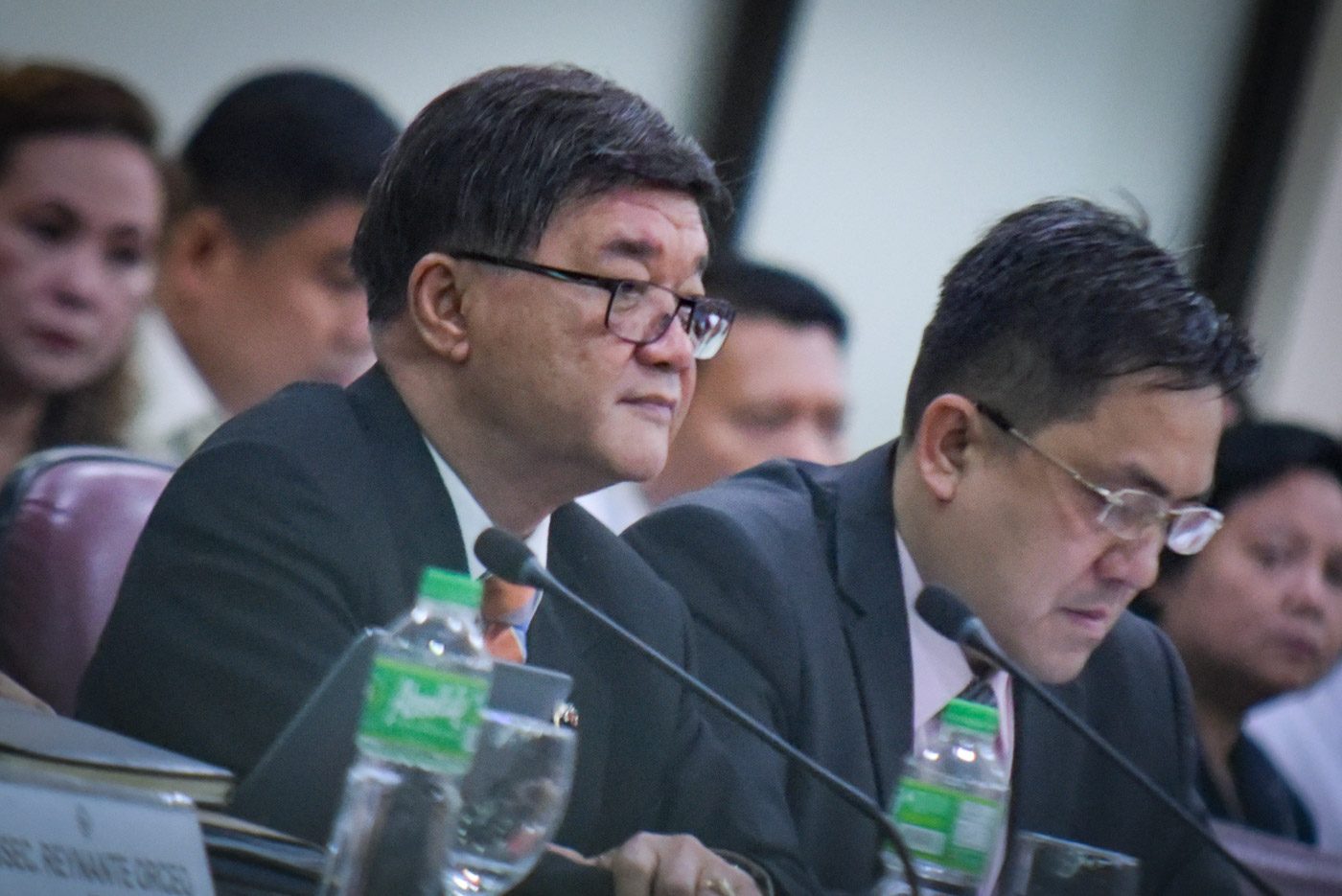SUMMARY
This is AI generated summarization, which may have errors. For context, always refer to the full article.

MANILA, Philippines – Justice Secretary Vitaliano Aguirre II on Wednesday, August 23, said there is no need at this point or in the near future to create an independent fact-finding commission to investigate alleged summary killings in the police’s war on drugs.
Aguirre said it is sufficient that the Philippine National Police (PNP), Criminal Investigation and Detection Group (CIDG) and the National Bureau of Investigation (NBI) are looking into allegations of extrajudicial killings (EJKs), saying they are “coping up.”
“As of this time, I am not seeing that to be done in the near and foreseeable future,” Aguirre said.
“Mr Secretary, it will be hard to trust the investigation to the police agencies because police is involved,” said Albay First District Representative Edcel Lagman, who was among the lawmakers who interpellated Aguirre on Wednesday during a hearing of the House committee on appropriations on the Department of Justice (DOJ) 2018 budget.
Lagman said an independent commission will “determine the motives or possible rewards for the killings, to determine numbers of killings, including by police and vigilante groups, recommend prosecution and recommend bible policies other than police action with respect to the drug menace, which is basically a poverty and health issue.”
Aguirre said extrajudicial killings in the war on drugs are just “exceptions to the rule,” adding that the case of slain 17-year-old Kian delos Santos is an isolated one.
“It is only in this Kian delos Santos killing that appears, that there is an abuse on the part of the policemen. At this stage, a commission is not yet necessary,” Aguirre said. (READ: Aguirre: Kian case overblown, any war has collateral damage)
Data on drug-war EJK cases
Based on Aguirre’s numbers, 3,050 people have died in legitimate police anti-drug operations.
But when Lagman asked how many cases were being investigated by the DOJ, Aguirre could not come up with a number.
This, despite the fact that he was asked the same question a week ago during a Senate hearing on the DOJ budget. The DOJ’s budget hearing was deferred in the Senate because Senator Franklin Drilon was not satisfied with Aguirre’s answers, even accusing the justice secretary of “hiding something.”
Aguirre told Lagman on Wednesday that he will submit “if not within the week, early next week” the collated data that will come from 223 city and provincial prosecutors’ offices nationwide.
Drug war-related EJK cases being handled by the DOJ have been repeatedly questioned.
Detained Senator Leila de Lima claims Aguirre has instructed his prosecutors not to file any charges against state agents enforcing the war on drugs, saying the DOJ “has not filed a single case.”
After De Lima first made the accusation, we asked about it on July 21. Aguirre was again quizzed about cases being filed by his office on August 17 in the Senate and then in the House on August 23. The justice secretary has yet to present his data.
Aguirre signed Department Order 120 which ordered the NBI to investigate alleged drug war EJKs. When asked by Drilon during about the status of the investigations, Aguirre was evasive.
It was NBI Director Dante Gierran who told Drilon that they were investigating 37 cases – 3 have been recommended for prosecution, while 3 have been recommended for closure.
“You call that performance? Of the over 4,000 cases related to drugs, exactly 37 being investigated and of the 37, 24 pending, 3 have been recommended for prosecution. Dismal. Well, it’s a part of the culture of impunity,” Drilon said.
Drilon came up with the number 4,000 based on Aguirre’s own declarations in the Senate budget hearing that there have been about 1,000 vigilante killings, on top of the 3,050 deaths from legitimate police operations.
‘Other EJKs’
When the DOJ presented before the UN Human Rights Council in Geneva, Switzerland last May, Undersecretary Renante Orceo used a different set of data.
Orceo said they were handling 219 cases of EJK based on the Aquino-signed Administrative Order (AO) 35 which seeks to resolve cases of enforced disappearances, torture, and other grave violations of the right to life, liberty, and security of persons.
EJKs that are covered by AO 35 are deaths of individuals from sectors such as media, labor, and other cause-oriented groups. “It doesn’t cover TokHang,” Aguirre said on Wednesday, referring to the earlier name of Oplan Double Barrel Reloaded or the police’s anti-drug raids.
Aguirre said that since Duterte, media killings have been removed from his jurisdiction and placed under Communications Secretary Martin Andanar in his Presidential Task Force on Violations of the Right to Life, Liberty and Security of the Members of the Media.
Orceo, in charge of the other EJKs under AO 35, said there have been no new cases under Duterte, given that media killings are no longer part of their coverage.
“As of this moment, since the President assumed office last year, there are still no new cases on extrajudicial killings, what we have right now is the old ones, 2-3 years ago,” Orceo said.
Still, in their 2018 budget, P33.2 million was allotted for operations for the other EJKs under AO 35.
That prompted BH Partylist Representative Bernadette Herrera-Dy to say: “Can you submit to the office (the data) because I’m trying to see, because this is P33 million, and kung wala naman palang ibang cases (if there are no other cases) we would like to see how you are spending this one.” – Rappler.com
Add a comment
How does this make you feel?
There are no comments yet. Add your comment to start the conversation.